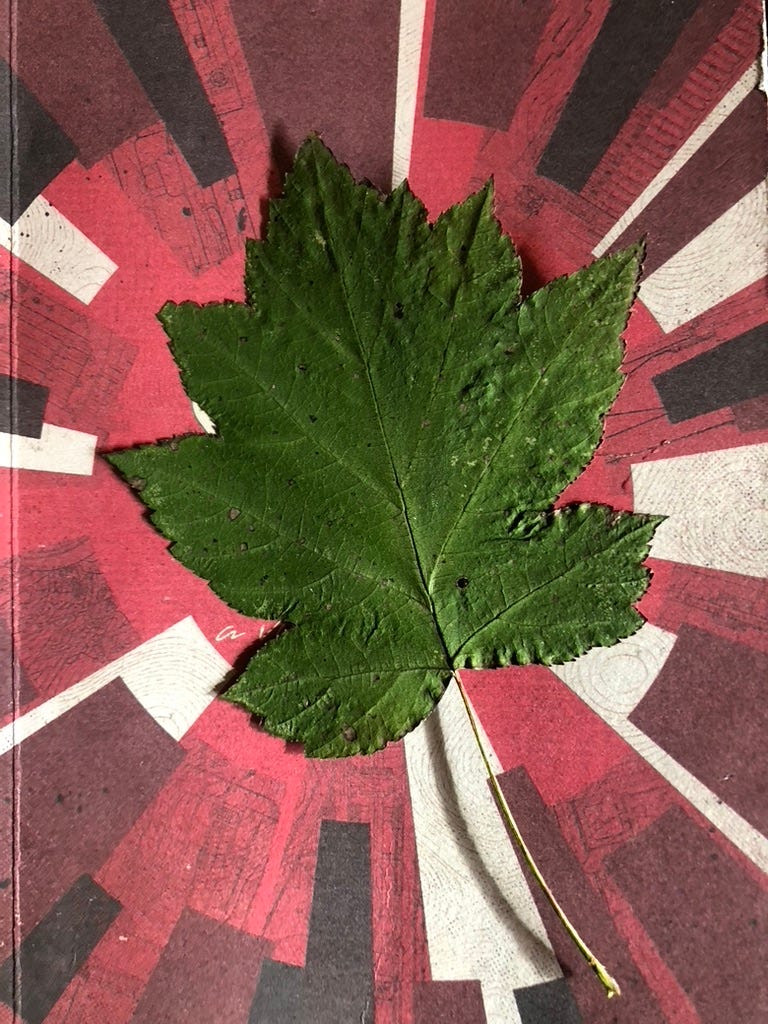#8 Wild Service
I walked out my house in search of a tree the other day. I walked under the three-lane six-exit roundabout and over the hissing north circular. I got to this tiny sliver of woodland hugging the river Ching, and passed dozens of police poking in the brush with litter pickers looking for guns and/or drugs. I walked through five blocks of relatively affluent suburb to an even smaller sliver of woodland, apparently hundreds of years old, an emaciated fragment of a vast, ancient forest. Here I saw the leaf shape I was looking for.
People say it looks like a hand: “an evocation of the open palm of belonging, the extended handshake of community”. I think it looks like my 5-year-old drawing of a christmas tree. We’re both right. I wish I had a more romantic story for coming across it (lost at night, cradled by its branches, following an old hermit, or even just by chance), but I found it because I was looking at my local council’s biodiversity action plan and from their list of “important species” the Wild Service Tree called for a closer look. Then I looked at the National Biodiversity Network’s Atlas and saw I had one of these nationally rare trees 20 minutes walk from my house. Let’s gooo.
The tree needs some mythologising. Although it used to be an abundant source of berries out of which beer was brewed, it doesn’t get its name from its ‘service’ to us or anyone else. The word ‘service’ comes from its old classification in the genus ‘sorbus’. But this shouldn’t stop us reading into it what we want to read into it. It hasn’t stopped Robin Wall Kimmerer.
In the so-called US, they have a Serviceberry (Amelanchier alnifolium) which she has chosen as the perfect case study for an alternative economy for humans to organise themselves around. This berry, in the Potawatomi language, is called Bozakmin. The root of this word ‘-min’, as with many other fruits, translates into ‘gift’. “In naming the plants who shower us with goodness, we recognize that these are gifts from our plant relatives, manifestations of their generosity, care, and creativity.” The berry, the birds that eat it, the detritivores which eat them and feed the roots of the bush are all embedded in relationships of reinforcing reciprocity.
It’s moving to see how many friends and comrades are struck by the work of Kimmerer. It’s the latest in an important (and sometimes troubled!) history of anarchists and idealists in ‘the West’ learning from Indigenous people about other ways of being. I think of Kropotkin’s Mutual Aid, inspired by his time amongst First Nations in Canada, or more recently Graeber and Wengrow’s Dawn of Everything animated by the legacy of indigenous leaders like Kandiaronk.
It was funny, when I got home from looking at the Wild Service Tree, a book which had been on our shelves for some time finally demanded to be taken down and read. It’s called Wild Service: Why Nature Needs You, and where Kimmerer focuses on the radical implications of the ‘gift’ its authors focus on the meaning of ‘service’. It’s a curious collection. It says ‘A Right To Roam Call To Action’ on the front. My copy is a green hardback with golden lettering, no dust jacket, woven with glorious linocuts from Nick Hayes and filled with reflections on a new/old culture, where humans are restitched into the fabric of the land.
It’s hard to summarise what this book is trying to do. It’s history of our forced dispossession from land in the UK, accounts of contemporary efforts to heal, philosophies of nature, stories of belonging and exclusion, declaration of rebellion and, maybe most importantly to me, a manual for something like a spiritual left politics:
“Wild Service is our manifesto for a grassroots ecology, a paean to the ability of 'ordinary' people to act for nature despite the fences, paywalls and gatekeepers standing in their way. It rejects the unpeopled wilderness fantasies (...) holding fast to the belief that diversity of people and the biodiversity of life go hand in hand. And it rejects the arrogance of 'stewardship' with all its implied paternalism and replaces it with the more modest idea of service instead, placing nature above the human, not below.”
I don’t think it can be said enough that the left needs spirituality. (A bummer because the word is so icky.) An effective political life needs rooting in a place and connection to a bigger, ultimately unfathomable, unfolding.
There is real, justified misery here. The lion’s share of what we have inherited from our recent ancestors is nothing less than evil and sickening. Realising this can mean loneliness, guilt, shame, paralysis, anxiety and on and on. To confront today’s genocides (and the practically inevitable future ones) without a thread connecting you to something else is, if not literally then figuratively, a death sentence. The only other route is numbness, a zombified life.
To be in service to something else: not blind or subservient but engaged, curious about this bigger force: building a map of constellations and principles and markers: freedom, land, wildness, belonging, creativity, reciprocity, beauty, stillness, love. Knowing that there is a place for you, that you are needed, but that you are not solely responsible, and that we are always to an extent fumbling about in the dark. This is an important idea for our time. An almost lost fragment of another culture, close at hand. A tree whose time has come.



